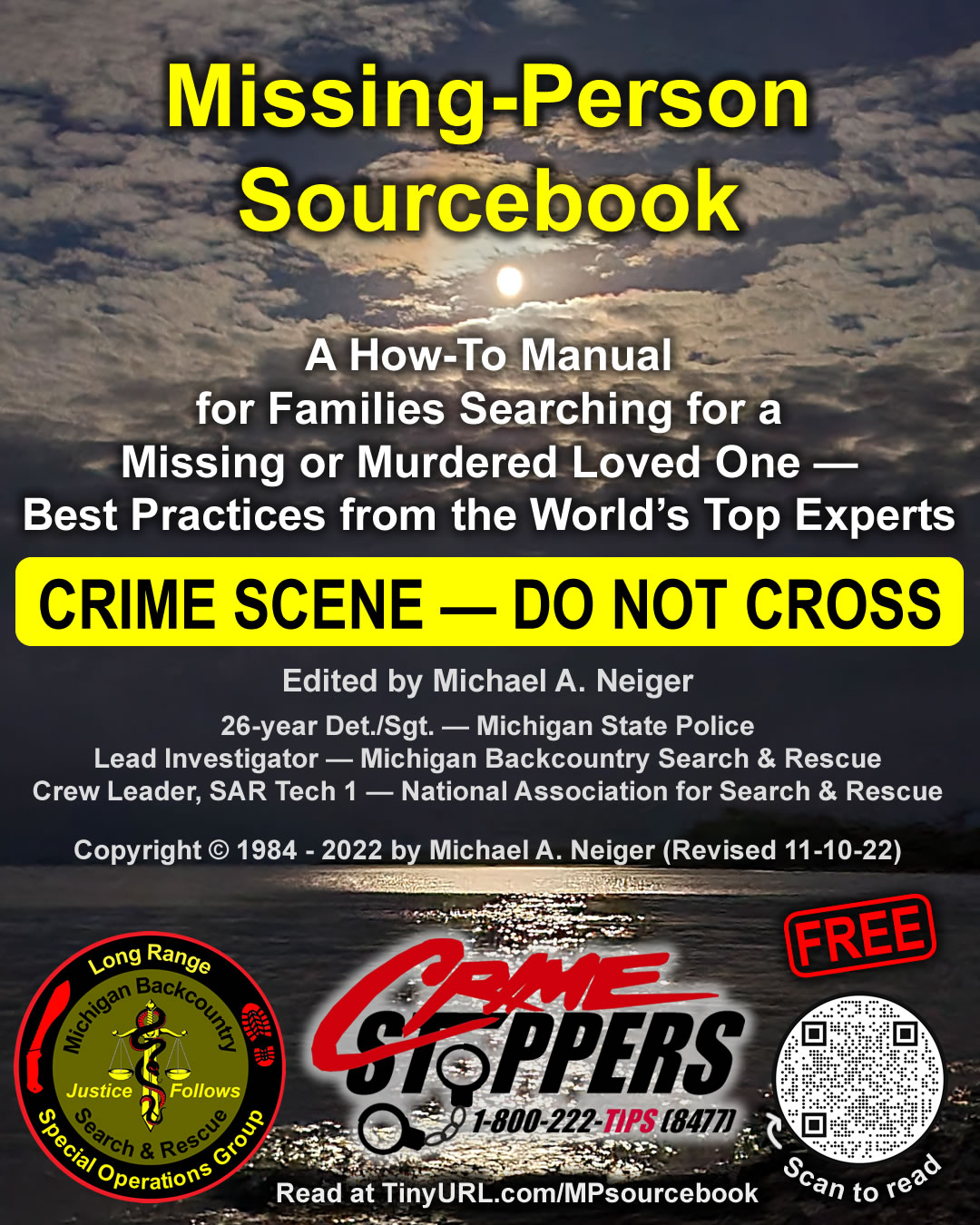
You're here: MibSAR :: M-P Sourcebook Table of Contents :: NamUs
Understanding the All-Important DNA-Based NamUs Database
| << Prior Chapter | Next Chapter >> |
It's extremely important to have your loved one's case entered in the U.S. National Missing and Unidentified Persons System (NamUs), a cutting-edge, nationwide information clearing-house offering free, secure, easy-to-use, online technology to help expedite case associations and resolutions.
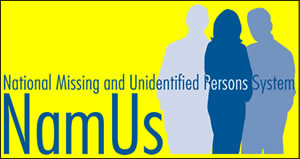 |
| The National Missing and Unidentified Persons System (NamUs) |
The NamUs database — much of which can be accessed and searched by the public — is the go-to resource for law enforcement officers and detectives, medical examiners, corners, allied forensic professionals, and others working in the missing-person industry.
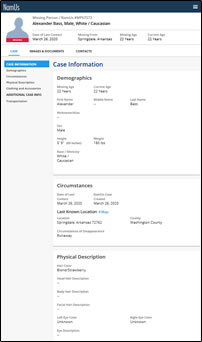 |
|
| A NamUs missing-person page | |
The database pulls together a wide array of information on individual missing-person cases, including:
- physical description,
- circumstances surrounding disappear-ance,
- scars, marks, and tattoos,
- clothing,
- jewelry and accessories,
- transportation,
- pictures,
- documents,
- DNA profile,
- fingerprints,
- dental records,
- and investigating agency contact info.
 |
|
| The University of North Texas Center for Human Identification (UNTCHI) — a nationally-accredited forensic laboratory that's globally recognized as a leader in forensic identification — is located on the campus of the University of North Texas Health Science Center (UNTHSC) in Fort Worth, Texas | |
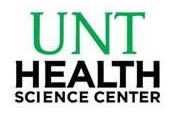 |
|
| The University of North Texas Health Science Center (UNTHSC) — one of the nation's premier graduate academic medical centers — is located in Fort Worth, Texas. | |
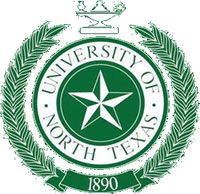 |
|
| The University of North Texas (UNT) is a public research university located in Denton, Texas. | |
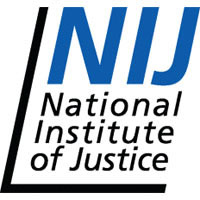 |
|
| The National Institute of Justice (NIJ) — part of the Office Of Justice Programs (OJP) branch of the U.S. Department of Justice (DOJ) — focuses on research, development, and evaluation of crime control and justice issues. | |
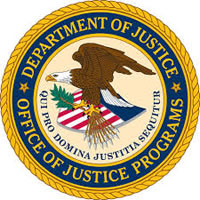 |
|
| The Office of Justice Programs (OJP) — an agency of the United States Department of Justice (DOJ) — provides innovative leadership to federal, state, local, and tribal justice systems by disseminating state-of-the-art knowledge and practices across America, and providing grants for the implementation of these crime fighting strategies. | |
NamUs is managed by the University of North Texas Center for Human Identification (UNTCHI) in Fort Worth, Texas — a nationally accredited forensic laboratory that's globally recognized as a leader in forensic identification — through a cooperative agreement with the University of North Texas Health Science Center (UNTHSC) — one of the nation's premier graduate academic medical centers — in Fort Worth, Texas.
All NamUs resources are provided free-of-charge to:
- law enforcement,
- medical examiners,
- coroners,
- allied forensic professionals,
- and family members of missing persons.
NamUs's core services include:
- DNA analysis,
- forensic odontology,
- forensic anthropology,
- fingerprint examination,
- investigative support,
- victim services,
- and training and outreach.
DNA
The cutting-edge DNA profile component of the NamUs database is often a game-changer for resolving missing-person cases, even decade's-old ones.
The profiles are assembled from non-invasive inner-cheek swabbings of a victim's relatives using free, family, DNA collection kits.
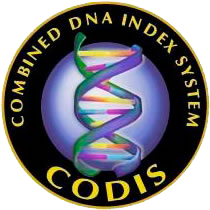 |
|
CODIS is the acronym for the Combined DNA Index System and the generic term used to describe the FBI’s program of support for criminal justice DNA databases as well as the software used to run these databases. The National DNA Index System (NDIS) is considered one part of CODIS, the national level, containing the DNA profiles contributed by federal, state, and local participating forensic laboratories. To learn more about this cutting-edge technology, visit the FBI's CODIS F.A.Q. page. |
|
 |
|
| The Federal Bureau of Investigation (FBI) | |
After the profile is entered into the Federal Bureau of Investigation's (FBI's) Combined DNA Index System (CODIS), it is compared against the DNA on file for all unidentified missing persons as well as compared with any DNA samples entered in the future for unidentified persons.
In addition to uploading nuclear DNA profiles into CODIS, the UNT Center for Human Identification’s Missing Person’s Unit is one of a small number of laboratories in the nation capable of developing and uploading mitochondrial DNA profiles into CODIS.
The unit also performs nuclear and mitochondrial DNA analyses to assist with the identification of missing and unidentified person cases.
Forensic Odontology
NamUs' Forensic Odontology Unit makes comparisons between known dental records of the missing person and those on file for unidentified missing persons.
Forensic Anthropology
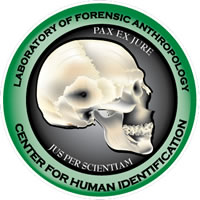 |
|
| The Laboratory of Forensic Anthropology (LFA) is part of the University of North Texas Center for Human Identification (UNTCHI ) | |
NamUs uses the University of North Texas Center for Human Identification's (UNTCHI's ) Forensic Anthropology Unit to analyze skeletal remains to:
- determine forensic significance and postmortem interval estimations,
- develop demographic profiles – such as sex, ancestry, stature, and age – to aide searches for possible matches,
- identify skeletal remains based on comparisons of medical and radiographic information,
- and conduct trauma analysis to contribute to cause and manner of death determinations.
Fingerprint examinations
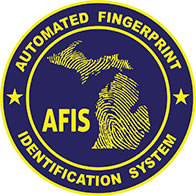 |
|
| Michigan's Automated Fingerprint Identification System (AFIS) is part of the Michigan State Police (MSP) | |
NamUs' Fingerprint/AFIS (Automatic Fingerprint Identification System) Unit:
- assists families with obtaining known fingerprint cards for a missing person from a variety of local, state, and federal law enforcement repositories, including military repositories;
- scans, classifies, uploads, analyzes, and compares fingerprints, including digitizing and uploading them to an internal AFIS database for searching and comparison;
- and submits unidentified decedent prints to the FBI’s Latent Print Support Unit for searching in the national Next Generation Identification (NGI) database.
If NGI searching does not result in an identification, the fingerprint information is then submitted to the Department of Homeland Security for searching through the Automated Biometric Identification System (IDENT).
Investigative support
NamUs' Investigative Support Division consults on cases and supports criminal justice efforts to resolve missing-person cases.
It also searches nongovernmental criminal justice databases and uses advanced search techniques to look for "indication of life" indicators on missing-persons cases.
Victim Services
NamUs' Victim Services Division provides information and support to families impacted by the loss or disappearance of a loved one, including:
- peer support network,
- mental health support,
- reunification,
- and outreach and education.
Eric Gonzalez
817.735.5167 eric.gonzalez@unthsc.eduKylie Kelley
817.735.5086
kylie.kelley@unthsc.edu
Training and Outreach
NamUs' Communications Division:
- responds to media inquiries,
- performs outreach to media,
- coordinates social networking efforts,
- and collaborates with victim advocate groups across the country to increase awareness and use of the NamUs program to resolve cases.
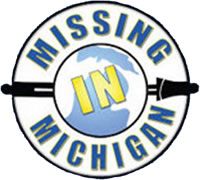 |
|
| Missing In Michigan (MIM) | |
NamUs' subject-matter experts offer a variety of free training and outreach services, to include:
- individualized assistance learning the NamUs 2.0 database application,
- customized, online or classroom training for agencies on the NamUs 2.0 database application, forensic services, and the effective use of NamUs tools to resolve missing and unidentified person cases,
. - presentations at local, state, and national training conferences,
- and assistance with the coordination and implementation of local and statewide “Missing Person Day” events to enter cases into NamUs and facilitate the collection of family reference DNA samples.
NamUs Contacts
- NamUs at UNT Health Science Center 3500 Camp Bowie Boulevard
Fort Worth, TX 76107
NamUs@unthsc.edu
855.626.7600
- NamUs' program specialist for Michigan (Region 6)
Lori Bruski
817.718.7904
Lori.Bruski@unthsc.edu
- NamUs' program specialist for Wisconsin (Region 3)
Allen Neal
682.347.8829
Allen.Neal@unthsc.edu
| << Prior Chapter | Next Chapter >> |
People who say it cannot be done,
should not interrupt those who are doing it.
— Author unknown

If you've been able to read this
Web page...
thank a Teacher;
If you've been able to read this
Web page in English...
thank a Veteran.
— Author unknown
Copyright © 1984-
March 23, 2021
by Michael A. Neiger
Contact Michael Neiger via e-mail at mneiger@hotmail.com
Top
You're here: MibSAR :: M-P Sourcebook Table of Contents :: NamUs